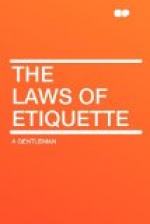La Bruy,re has elsewhere given this happy definition of politeness, the other passage being rather a description of it. “Politeness seems to be a certain care, by the manner of our words and actions, to make others pleased with us and themselves.”
We must here stop to point out an error which is often committed both in practice and opinion, and which consists in confounding together the gentleman and the man of fashion. No two characters can be more distinct than these. Good sense and self-respect are the foundations of the one—notoriety and influence the objects of the other. Men of fashion are to be seen everywhere: a pure and mere gentleman is the rarest thing alive. Brummel was a man of fashion; but it would be a perversion of terms to apply to him “a very expressive word in our language,—a word, denoting an assemblage of many real virtues and of many qualities approaching to virtues, and an union of manners at once pleasing and commanding respect,— the word gentleman."* The requisites to compose this last character are natural ease of manner, and an acquaintance with the “outward habit of encounter”—dignity and self-possession—a respect for all the decencies of life, and perfect freedom from all affectation. Dr. Johnson’s bearing during his interview with the king showed him to be a thorough gentleman, and demonstrates how rare and elevated that character is. When his majesty expressed in the language of compliment his high opinion of Johnson’s merits, the latter bowed in silence. If Chesterfield could have retained sufficient presence of mind to have done the same on such an occasion, he would have applauded himself to the end of his days. So delicate is the nature of those qualities that constitute a gentleman, that there is but one exhibition of this description of persons in all the literary and dramatic fictions from Shakespeare downward. Scott has not attempted it. Bulwer, in “Pelham,” has shot wide of the mark. It was reserved for the author of two very singular productions, “Sydenham” and its continuation “Alice Paulet”—works of extraordinary merits and extraordinary faults—to portray this character completely, in the person of Mr. Paulet
* Charles Butler’s Reminiscences
CHAPTER II. DRESS.
First impressions are apt to be permanent; it is therefore of importance that they should be favourable. The dress of an individual is that circumstance from which you first form your opinion of him. It is even more prominent than manner, It is indeed the only thing which is remarked in a casual encounter, or during the first interview. It, therefore, should be the first care.
What style is to our thoughts, dress is to our persons. It may supply the place of more solid qualities, and without it the most solid are of little avail. Numbers have owed their elevation to their attention to the toilet. Place, fortune, marriage have all been lost by neglecting it. A man need not mingle long with the world to find occasion to exclaim with Sedaine, “Ah! mon habit, que je vous remercie!” In spite of the proverb, the dress often does make the monk.




